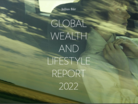7 ways the spending habits of HNWIs in Asia are changing

The pandemic has had a much greater impact on the spending habits of High-Net-Worth Individuals (HNWIs) than on the wider population.
That’s according to Julius Baer’s first-ever Lifestyle Survey of global HNWIs – defined as having bankable household assets of US$1m or more excluding primary residence or pension funds), which analysed the trends in consumption, lifestyle, and financial intentions of HNWIs in early 2022.
So, how have the spending habits of HNWIs across Asia-Pacific changed in the last year compared to the pre-pandemic era? And what are some of the biggest trends in the consumption and lifestyle patterns of the wealthy across the region?
Asia continues to be the most expensive region overall, with Shanghai still the world’s most expensive city, according to the Index, with four items ranked at the very top, and the highest weighted-average price increase of 30%. While cars are most expensive to buy in Asia, hotel rooms are much cheaper, say, than Europe.
Taipei has moved up the rank to third, mostly due to the prices of shoes, bikes, and wine, while Jakarta has risen one place to 19th. Bangkok has fallen four places to 15th, having become noticeably cheaper in relation to other regional cities, while Tokyo has slipped the furthest globally, from second to eighth, driven by 13 items ranking lower than in the previous year. This is mostly down to the value of the yen, which has depreciated considerably against the dollar.
Here's how else the spending habits of HNWIs in Asia has changed post-pandemic.
1. Demand for technology grows Demand for technology has grown strongly across all regions, including across Asia, unsurprising given the huge rise in remote working since the onset of the pandemic. The shift has also led to more frequent upgrading of personal tech, including devices ranging from smartphones and laptops to webcams and WiFi-enabled equipment. “Moreover, it looks likely that the post-pandemic investments in personal technology will persist,” states the report, as many will never return to the office fully and will therefore continue to require high-spec tech at home.
2. Growing demand for private vehicles Like tech, the growth in demand for private vehicles was pandemic-related with the fear of Covid-19 driving people away from public transport and towards their own cars. In particular, the pandemic has seen a boost in interest in electric and hybrid vehicles, with China (the world’s largest market), expected to see EVs represent 25% of total sales by 2025. It’s the wealthy that are more likely to buy expensive cars, whether electric, hybrid or petrol, but also to be environmentally conscious and early adopters, reveals the report. Asia is the most expensive region to buy a car, the single most expensive item in the basket.
3. Wellbeing sees growth in expenditure Wellbeing has seen, and will continue to see, growth in expenditure for medical and fitness reasons. The report finds that in countries with national healthcare systems, like the UK, spending on health insurance is also rising in many cases.
4. Self-improvement a big spender HNWIs in Asia have a rosier business and professional outlook than Europeans or Americans, and of all regions, are most confident in both their professional and financial situation. The report finds that in a possible indication of a desire to get back to work, they are investing in self-improvement, with respondents in the region more likely to spend on everything from education and MBAs to cosmetic surgery and fitness.
5. Experiential spending on up The report finds a strong intention by HNWIs across Asia-Pacific to return to spend experientially, in particular on leisure activities and travel.
6. More emphasis on exclusivity HNWIs in Asia place more emphasis on exclusivity, both in shopping and service, than those in Europe or the US. While Europeans want a quality product with good advice and aftercare, wealthy Asians are more interested in an exclusive buying experience. “This might explain why many of the most luxurious brand boutiques today are in Dubai or Shanghai, not London or Milan,” reveals the report.
7. ESG concerns surge and Asia leads the way Across all regions, but especially in Asia, sustainability is a very, if not extremely, important consideration for respondents. HNWIs generally want to promote sustainability through investments, which is why ESG plays an increasingly important role when it comes to investment decisions. And when it comes to high-end consumption, Asian HNWIs are more conscious about environmental and fairtrade concerns than other nationalities.



